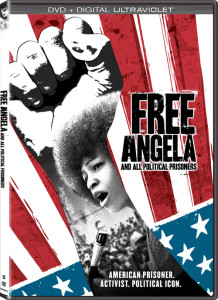
‘Free Angela’
Power to the people.
by Megan Smith
In 1970, nothing scared the United States government more than a woman of color who was a member of the Black Panther Party, a vocal feminist activist, and an open communist. Angela Davis was all of those things. In her documentary Free Angela and All Political Prisoners, director Shola Lynch delves into the life of this world-renowned political activist and scholar.
After spending time as a graduate student in Europe, Davis was recruited to be an assistant professor of philosophy at the University of California-Los Angeles (UCLA). Her first lecture drew two thousand students who were all curious about this controversial professor. Despite positive student response, the University of California Board of Regents fired Davis from her post for her affiliation with the Communist Party. This incident was only the beginning of Davis’s controversies.
 Soon after, violence and death struck at the Marin County courthouse. Radical activist Jonathan Jackson, a friend of Davis, attempted to negotiate the freedom of the Soledad Brothers—which included his brother George—by kidnapping Judge Harold Haley. A shootout occurred and four men, including Haley and Jackson, were killed. Two guns used in the incident were registered in Davis’s name—guns she had bought
Soon after, violence and death struck at the Marin County courthouse. Radical activist Jonathan Jackson, a friend of Davis, attempted to negotiate the freedom of the Soledad Brothers—which included his brother George—by kidnapping Judge Harold Haley. A shootout occurred and four men, including Haley and Jackson, were killed. Two guns used in the incident were registered in Davis’s name—guns she had bought
for protection after receiving death threats during her days
at UCLA.
Davis was immediately accused of kidnapping, murder, and conspiracy. She sought refuge underground, was placed on the FBI’s Ten Most Wanted list, and was presumed guilty. But, as one of Davis’s supporters stated, “What they’re doing to her is an exaggerated form of what happens every day to black people in this country. Would you give yourself up to the vultures?”
Hundreds of “Angela Davises” were arrested—any woman of color who had a similar Afro hairstyle was suspect. When finally arrested, the police insisted on checking Davis for her signature front tooth gap to prove that she was the real deal.
From there, the film details her twenty-two-month prison experience. During this time, the “Free Angela and All Political Prisoners” campaign spread across the world. Davis insisted on having “all political prisoners” added to the slogan—she would not forsake her activism for others despite her own imprisonment.
Although Davis came out as a lesbian in 1997, her history proves that sexuality can be fluid. What sets this documentary apart from others is its in-depth look at the relationship between Davis and George Jackson. Previously described as solely political, it is revealed that her love for Jackson was actually quite intimate—an FBI statement notes that the two were caught “kissing” and “fondling” in prison. “Sexuality was a very low-key thing in the Party,” Robyn Ceanne Spencer, a member of the Black Panther Party, wrote in her essay “Engendering the Black Freedom Struggle.” “It was just natural that women had women lovers and men lovers at the same time.”
Rich with amazing historical footage and interviews of Davis’s friends, family, and fellow Party members, the documentary ends as Davis is unexpectedly acquitted. The final imagery of Davis with her fist raised in salute truly exemplifies what it means to give power to the people.
Available August 20 from Lionsgate Home Entertainment.










